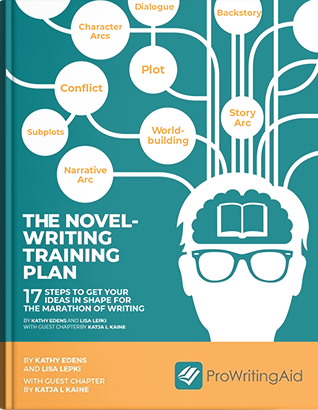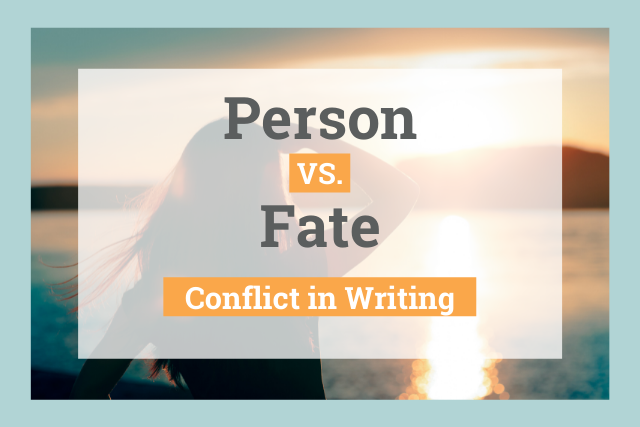
Of the seven types of literary conflict, there’s one type that’s never a fair fight.
I’m talking about person vs. fate—when a character struggles against his or her own destiny. One way or another, fate always wins.
Even though the outcome is often predetermined, this conflict type still has a lot of room for nuance and depth.
Using it can help you provoke character growth and add tension to your story.
In this article, I’ll explain what person vs. fate conflict is, discuss some popular examples in literature, and show you how to use this conflict type in your own writing.
What Is Person vs. Fate Literary Conflict?
Person vs. fate conflict (also known as man vs. fate or character vs. fate) refers to a protagonist’s battle against their own destiny.
Usually, the future has been predetermined in some way (for example, a character struggles against a prophecy that they will die), but the protagonist struggles to accept it. This makes it a type of external conflict.
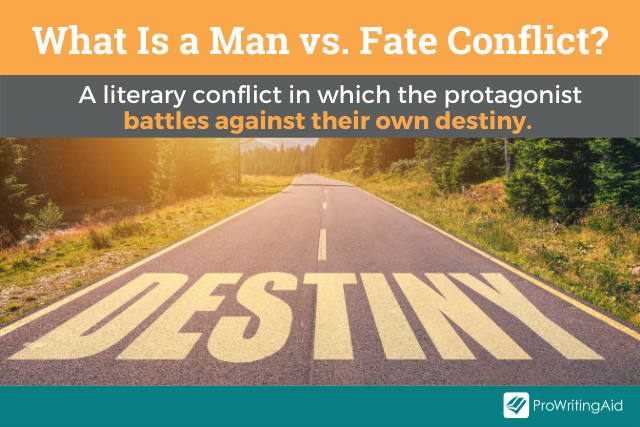
As September C. Fawkes states, man vs. fate conflict is distinct from person vs. god conflict because fate doesn’t always have to relate to organized religion.
“Fate” can be something as dramatic and fantastical as a pantheon of gods or an oracle’s prophecy. Or it could be something as simple and everyday as a medical diagnosis or an arranged marriage.
Often, the conflict is about the protagonist coming to terms with their own destiny and deciding how they want to move forward and face it.
What Are the Best Examples of Person vs. Fate Conflicts?
The origin of the man vs. fate conflict type was in ancient Greek mythology, so many readers and writers assume that this is an outdated conflict type.
On the contrary, it still has a lot of potential in modern stories.
Let’s look at some well-known examples of man vs. fate, from ancient Greek plays to modern-day novels.
Oedipus Rex by Sophocles
Oedipus Rex is the most famous example of a man vs. fate conflict.
The play centers around a prophecy that Oedipus will kill his father and marry his mother. In order to prevent this from happening, a shepherd takes the infant Oedipus far away, where another family adopts him. After learning about the prophecy, Oedipus tries to escape it by running away from his adoptive family.
This choice leads him back to his true biological parents, where he does indeed kill his father and marry his mother without knowing he’s their son.
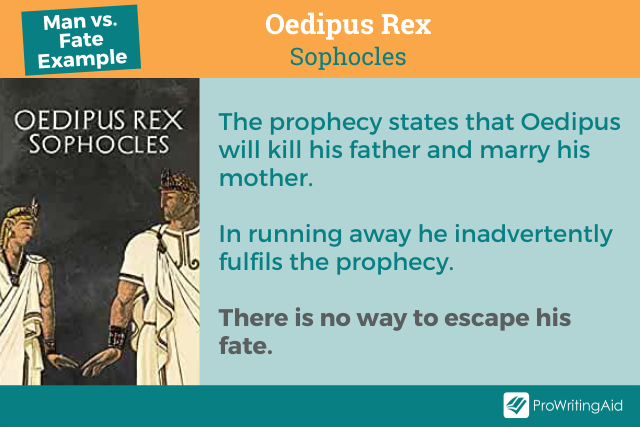
This tragic play illustrates that there’s no use fighting fate. In fact, it’s actually Oedipus’s attempt to run away from the prophecy that allows the prophecy to come true.
The more you fight against fate, the more you play into fate’s hands.
Wicked by Gregory Maguire
Wicked, a bestselling novel and Broadway play that tells the life story of the Wicked Witch of the West, is a more modern example of man vs. fate.
Elphaba is born green, which causes everyone in Oz to perceive her as different and strange. She longs to establish her own identity, but her circumstances make that impossible. She has to choose between her own sense of self, or her community.
The reader knows from the beginning that Elphaba is destined to become the Wicked Witch of the West, because this is the premise of the book.
However, we don’t know how she’ll become the Wicked Witch of the West, and it’s this tension between who she is and who she’s meant to be that keeps us reading.
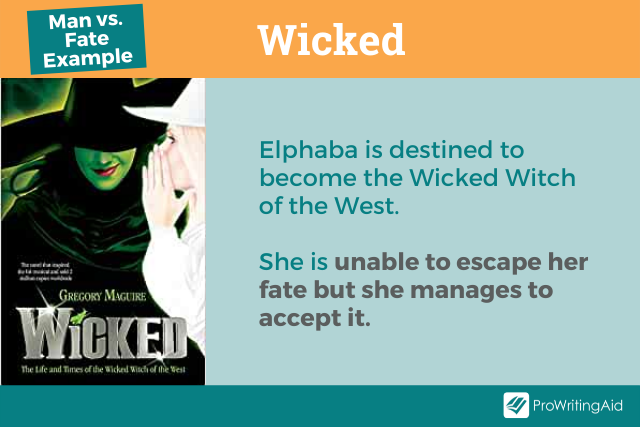
After struggling against her fate and questioning whether she ever had control of her own destiny, Elphaba ends up embracing her identity as the Wicked Witch of the West and accepting that this is who she’s meant to be. She hasn’t managed to escape fate, but she’s managed to accept it.
Because the reader already knows Elphaba’s fate, the novel is more about how she deals with events outside of her control. In character vs. fate conflicts, it’s especially key to help you reader understand how your character is feeling.
ProWritingAid’s Style Report highlights emotional tells in your writing.
These are words like scared, happy, or excited that may indicate that you are telling your reader what your character feels, rather than showing them through action, subtext, and dialogue.
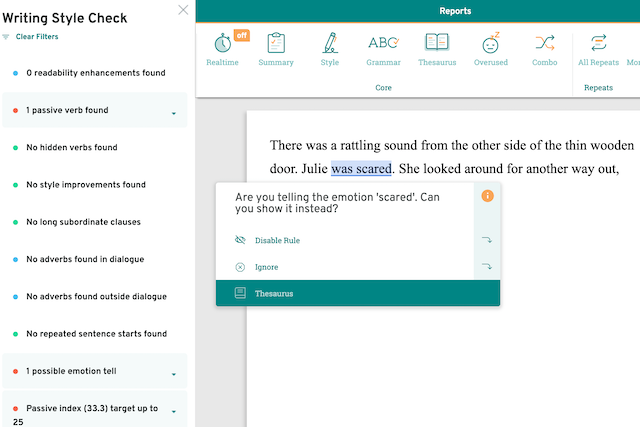
By replacing your emotional tells with clues to how your character is feeling, you increase the stakes in your conflict—and that’s how you keep readers engaged.
Try the emotional tells check with a free ProWritingAid account.
The Time Traveler’s Wife by Audrey Niffenegger
Time travel stories put an interesting new spin on man vs. fate.
In The Time Traveler’s Wife, Henry has a condition that causes him to travel spontaneously to different years within his own lifetime.
As a result, Henry often knows about events before they occur, because he’s seen them before.
However, it’s impossible for him to use this knowledge to prevent these events from happening, since they’re destined to occur regardless of his actions.
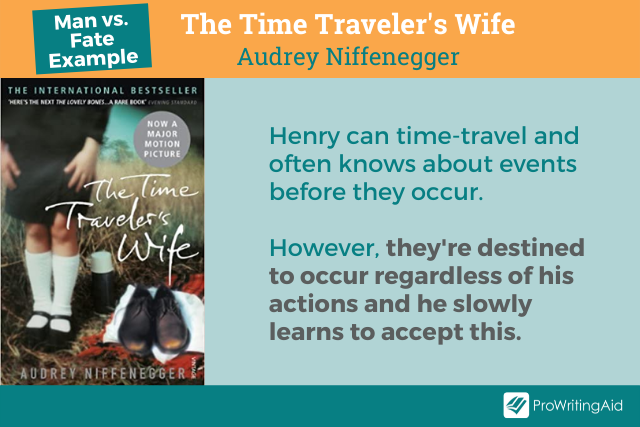
For example, Henry tries over and over to warn a mother that her child is about to be in an accident, but the child always dies, no matter what he does.
Henry eventually learns to accept that he can’t fight the future. It’s a fascinating battle of man vs. fate that takes place over and over throughout Henry’s life.
Harry Potter and the Half-Blood Prince by J.K. Rowling
In the sixth book of the Harry Potter series, Harry learns about the prophecy that marks him as the Chosen One.
According to the prophecy, neither Harry nor Voldemort can live while the other survives.
For Harry, this prophecy feels like a curse. He doesn’t want the burden of knowing that he has to be the one to defeat Voldemort.
Over the course of the book, Harry struggles to come to terms with this prophecy. He has to decide if he wants to keep fighting this destiny or to embrace it.
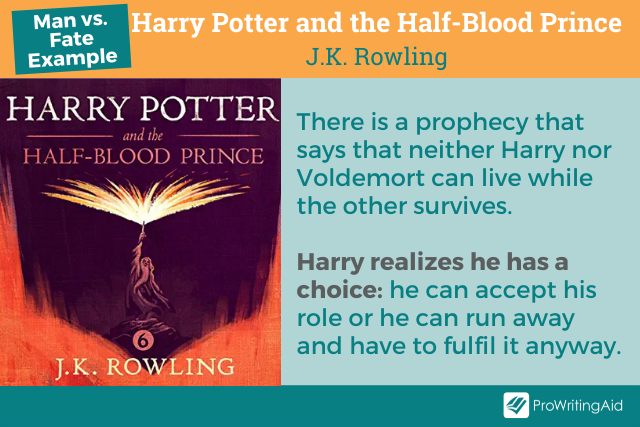
At last, Harry realizes he has a choice: he can accept his role and walk toward it with dignity, or he can keep running from it and end up having to fulfill it anyway.
They Both Die at the End by Adam Silvera
In this young adult novel, two teenage boys, Mateo and Rufus, are told that they have only one day left to live.
The title, They Both Die at the End, tells us what’s going to happen at the end of the book. We all know that there’s no way they’ll be able to survive at the end of the book.
Nonetheless, we keep reading, because we want to see what happens during their last night alive.
Even though they know they’re doomed, Rufus and Mateo still manage to build a relationship together, however fleeting, before their fates catch up to them.
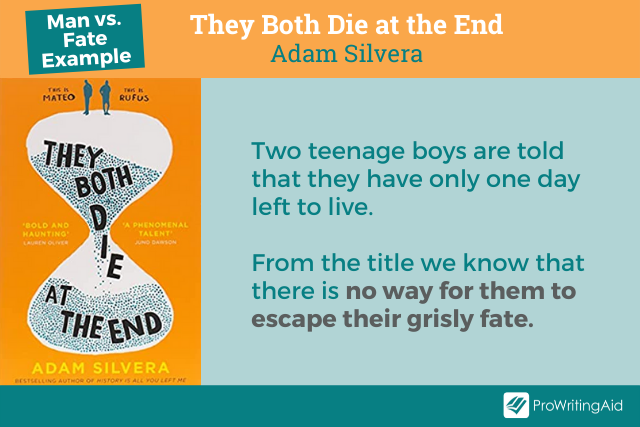
This book is a great example of a man vs. fate in a contemporary story. There are no gods or prophecies—this is just the tale of two normal teenagers struggling to accept something that they know must happen.
How Do You Create Person vs. Fate Conflict?
Person vs. fate conflict is a fantastic tool for fostering character growth and exploring deep questions in your stories.
Here are some of my top tips for using this type of conflict in your own fiction.
Choose a Specific Source of Fate
In order for fate to be a strong antagonist, your readers have to trust "fate." You need to show the future in a way that feels likely to be true.
There are many different sources of external conflict you can use for fate.
Maybe a doctor tells your protagonist they have a month to live. In this case, the source of fate is modern medicine, which is generally a trustworthy source.
Maybe a court judge tells your protagonist they’ll be executed in a month. In this case, the source of fate is the judicial system, which is also is generally a trustworthy source.
Or, as a more obvious example, maybe a prophet tells your protagonist their life will end after one more cycle of the moon.
In this case, the source of fate is whatever god or higher power that creates the prophecy.
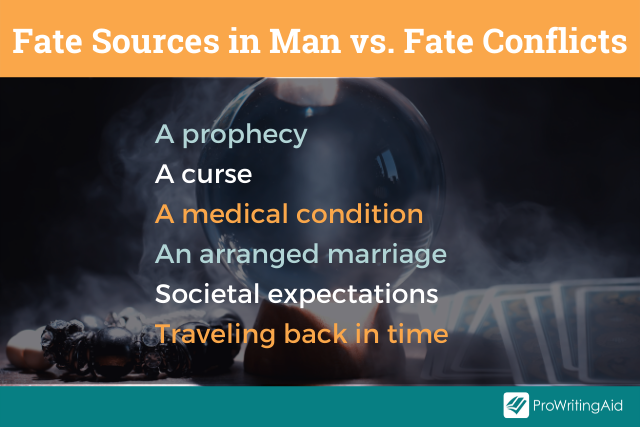
You might not consider a prophet to be a trustworthy source in the real world, but that doesn’t matter—all that matters is whether or not your characters trust it.
The main character must believe in fate in order for the readers to care about their struggle against it.
You can choose any source you want, as long as it’s believable within the context of the story.
Don’t Reveal All the Answers
Usually, "fate" in the context of literary conflict refers to some kind of future that’s been preordained.
You have to show the reader glimpses of the future in order to establish fate as an antagonist.
However, it’s important not to show everything that’s destined to happen. If you tell the reader everything that happens next, you’ll take all the suspense and mystery out of the story.
Instead, give the readers small teasers. You can show a snippet from a scene that doesn’t fully make sense yet until it’s shown in context.
Or you can give the readers an obscure prophecy that creates more questions than it answers.
The trick is to give just enough to draw the reader in, but not so much that they already know what’s going to happen next without needing to keep reading.
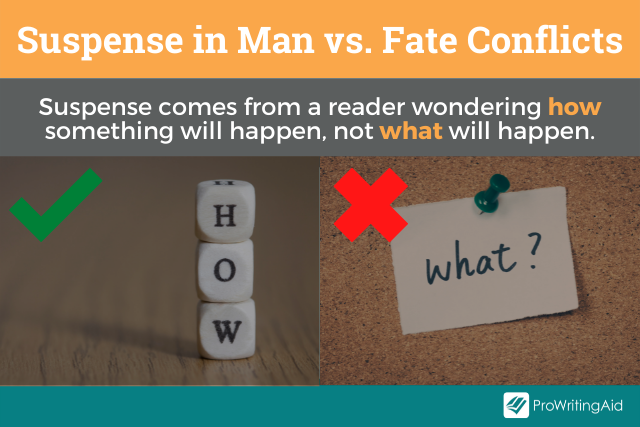
Done well, the suspense should come not from wondering what’s going to happen at the end of the story, but instead, how that’s going to happen.
Create Room for Free Will
In Oedipus Rex, Oedipus would never have fulfilled the prophecy if he hadn’t tried to run away from it. His own choices led him to his destiny.
Often, free will can’t change that outcome that fate has decreed. However, that doesn’t mean free will doesn’t matter.
There’s a great quote in Harry Potter and the Half-Blood Prince:
“It was, he thought, the difference between being dragged into the arena to face a battle to the death and walking into the arena with your head held high.”
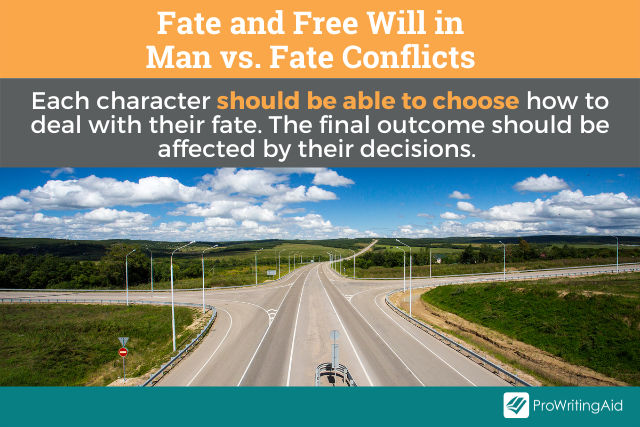
This difference is key in character vs. fate stories. Either way, the character will die in the arena, but their free will still makes a difference. Having your character negotiate these two competing desires will tell your reader a lot about them.
Show how the character finds a way to deal with their fate, and how their decisions affect the final outcome. Creating room for free will helps give your story meaning.
How Do You Make Person vs. Fate Conflict Believable?
Because fate is such a big adversary, you need to create a strong character to go up against it.
That doesn’t mean your character has to be physically, mentally, or emotionally strong. But they should show depth of emotion and change considerably over the course of your story. This is what will keep readers turning pages.
There you have it: a complete guide for understanding and creating person vs. fate conflict.
What are your favorite books where a character struggles against his or her own destiny? Let us know in the comments.

